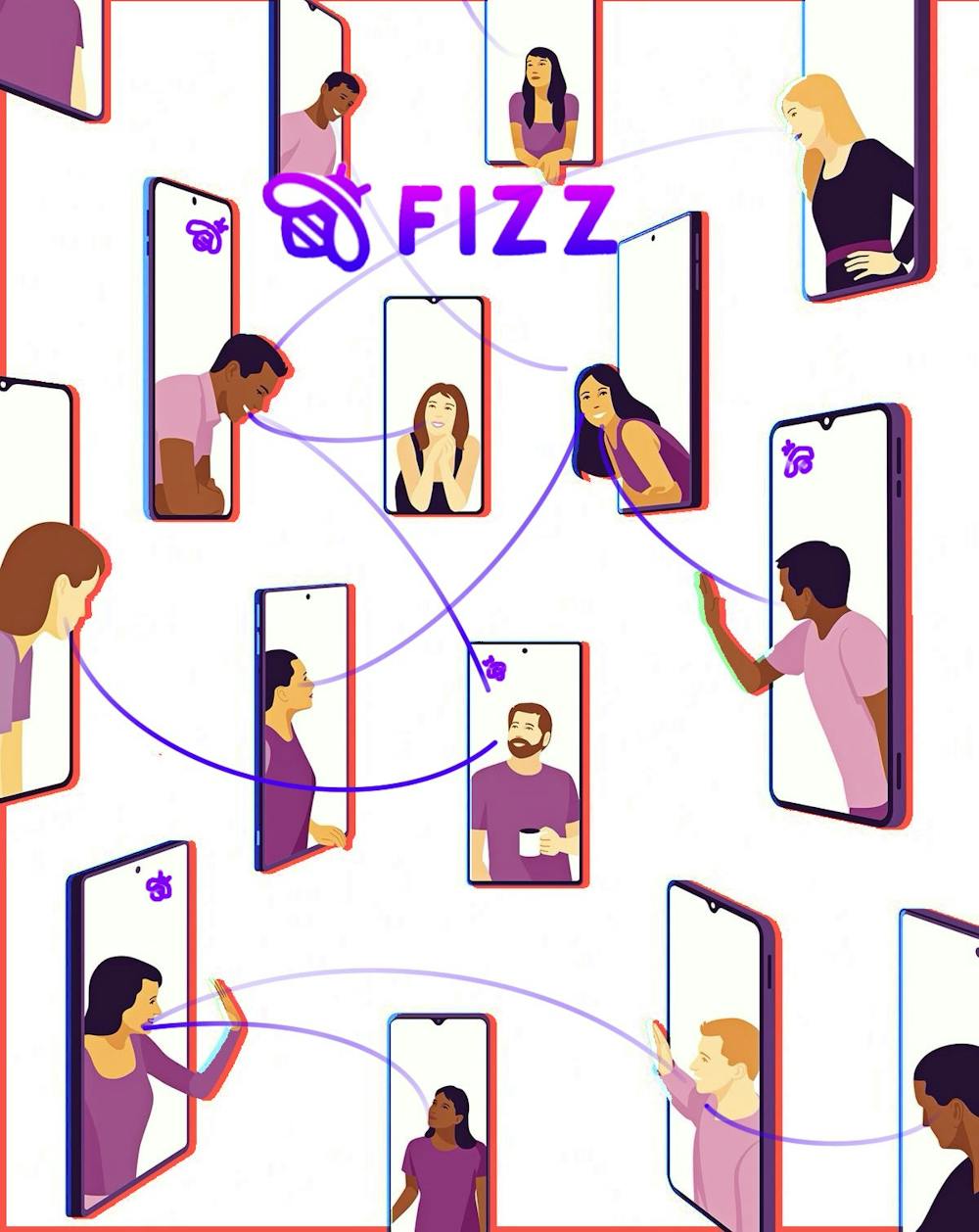Fizz users and moderators talk fame, challenges

Amber Wang / Thresher
During the volleyball team’s face-off against the University of Texas at Austin on Sept. 3, Jack Vu decided to have a little fun with the scoreboard. An anonymous poster had inaccurately mentioned that Rice beat UT on Fizz, so Vu decided to join in.
“I posted a picture of the scoreboard saying ‘Rice wins,’” said Vu, a Sid Richardson College freshman. “I pretended like Rice won the volleyball game.”
Three years since the anonymous social media app arrived on campus, Fizz has become a hub for gossip, student mobilization and even misinformation that shapes how students see themselves and one another.
Audrey Arroyave, a Lovett College senior and Fizz moderator, said anonymity gives students the courage to speak out against campus policies or frustrations with administration, but can also give students an excuse to spread negativity, especially to incoming freshmen.
“In regards to mobilizing students against something that they all don’t agree with, there was so much unity on Fizz during the meal swipe thing,” Arroyave said. “But then, when it comes to talking about the worst colleges, talking about publics being bad, especially for the freshmen who can now join Fizz the summer before they even come here, I think that’s really bad, and I think there should be a way to not allow that.”
Arroyave said she first got involved with the app during her sophomore year when Fizz reached out to her about managing the platform.
“I think they send out requests to people who are ranked high enough or use it frequently enough,” Arroyave said. “I used it a lot as a freshman, so that’s why.”
While the moderator job was once paid, Arroyave said all of her work is now unpaid and on a volunteer basis. Part of her job is to decide whether posts need to be removed. Each time a post gets reported, it gets sent to three moderators who decide whether or not to allow it.
“We get reports on our phones and we get the option to allow it or remove it,” she said. “If two out of three [moderators] choose the same action, then it’s either allowed or removed.”
Arroyave said that moderating Fizz is extremely tricky, especially when sometimes the moderators disagree on what’s allowed.
“I’ve seen [posts] before that even if I vote to take it down, it’ll stay up, which means that other moderators allow it to stay up,” Arroyave said.
Following the announcement of Chao College, Fizz experienced a surge of posts, some making fun of the name or the Chao family’s Asian heritage.
“chao college don’t got a president, they have an emperor,” one anonymous user wrote.
Other users expressed xenophobic views, writing that Chao College was part of a “Chinese takeover of Rice.”
“I think Chao’s government should be called Chao Community Program or CCP for short,” another user wrote.
Arroyave said the racial insensitivity of the posts was disappointing but not surprising.
“I got a lot of reports throughout the following days, most of which were negative and racially insensitive,” Arroyave wrote in a message to the Thresher. “Unfortunately I wasn’t really surprised by the student response, given what I’ve seen on Fizz, but it was a little disappointing.”
However, not all posts on Fizz are about recent events. Students can post memes, event information, shoutouts and questions. There is also an online marketplace on the Fizz app.
Vu’s first post was a “crush” submission about his roommate, Ian Vazquez, who promptly retaliated by posting one about Vu. What started as a playful back-and-forth soon spiraled into something bigger as more students began posting about Vu.
“That was fun, but after that, you get a space to sort of air out every rumor on campus, which is maybe at least partially the negative,” Vu said. “Sometimes, in the elevator, someone would look at me a little funny.”
Muyiwa Ogunsola has also been featured on Fizz, usually alongside Vasquez. Ogunsola said he finds it off-putting whenever he sees his own name mentioned on the app.
“I know sometimes friends will post each other as jokes or whatever, but when it’s somebody you don’t know posting about you, it’s a bit odd,” said Ogunsola, a Hanszen College sophomore. “[It’s] especially odd when you know they wouldn’t do it on a platform that can be traced, like Instagram or Twitter.”
Ogunsola said being “Fizz-famous” is more uncomfortable than flattering, but that he trusts Rice students to look beyond Fizz posts.
“I think that my peers at Rice are not dumb enough to be judging someone fully off of what they hear on Fizz,” he said. “They know that there’s more to one person than that.”
Ogunsola also said the anonymity of Fizz can be a double-edged sword when it comes to campus interactions.
“It makes it so that people feel like they can talk to the whole community without exposing themselves, and so that it’s sort of easier to talk about certain issues,” Ogunsola said. “It also makes it easier to attack people personally and easier to make hateful comments.”
Arroyave said she does not want Fizz to disappear, but would like students to use it more thoughtfully.
“I just wish that people would think a little bit harder about what they’re putting out there, especially when it’s misinformation about someone in particular or something negative,” Arroyave said. “I wish that people would be a little bit nicer in regards to that.”
More from The Rice Thresher

Rice loses to UH in Bayou Bucket Classic
The Bayou Bucket will remain with the University of Houston until at least 2030 after Rice football lost to the Cougars Saturday.

Moody Center’s new exhibit blurs the line between body and machine
Swelling latex sculptures, inspired by placentas and umbilical cords have taken up residence in the Moody Center for the Arts. The Barcelona-based artist Eva Fàbregas describes her pieces as forms that grow from “the guts of the architecture,” inflating and wrinkling as if they were alive.

New fiction course allows writers to incorporate and “resist” AI influence
Rice is bringing generative artificial intelligence into the creative writing world with this fall’s new course, “ENGL 306: AI Fictions.” Ian Schimmel, an associate teaching professor in the English and creative writing department, said he teaches the course to help students think critically about technology and consider the ways that AI models could be used in the creative processes of fiction writing.

Please note All comments are eligible for publication by The Rice Thresher.